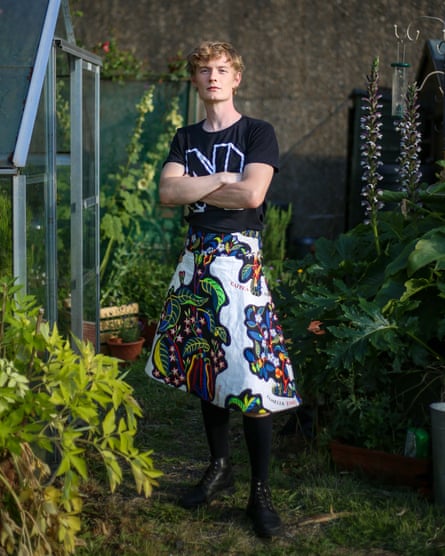
My sister has three questions she asks men who say they’re feminists. It only takes one “yes” to pass her test, and yet few do. The questions are: if you get married to a woman, would you (and any kids) take her surname? If you had children with a woman, would you step back from your career to be their primary carer? And, simplest of all, would you wear a skirt in public?
The questions are lighthearted, and not intended to truly cut to the heart of feminist issues, but it’s interesting to see how many men sheepishly give three “no” answers nonetheless. Despite much apparent progress towards gender equity, some conventions around how men feel they must act and dress differently to women are stubbornly persistent, from family to fashion.
Baby names and childcare arrangements are inherently fraught topics, but I’m surprised how many men say they’d never even consider wearing a skirt. Twenty years ago, the curator Andrew Bolton noted that “while women enjoy most of the advantages of a man’s wardrobe, men enjoy few of the advantages of a woman’s wardrobe”, and that “nowhere is this asymmetry more apparent than in the taboo surrounding men in skirts”. While a few celebrities, such as Brad Pitt and LA Lakers basketball player Russell Westbrook, have worn skirts to red carpet events, it’s still vanishingly rare to see normal men wear normal skirts day to day.
Blokes, you’re missing out! I began wearing skirts six years ago to see if my sister had a point, and it’s only since then I realised what I’d been missing. Skirts are fantastically versatile: thick, pleated and cosy in the winter, light and breezy for summer. They come in a vast array of shapes and characterful styles, leaving the frigid palette of blacks, blues and browns that dominates most male fashion in the dust. You’ll easily find more panache in the skirts section of M&S than in its entire menswear department.
Men who’ve never worn them will often claim skirts are impractical, but this simply isn’t true. Free from complex gussets, skirts are less likely to tear than trousers, but easier to mend and usually straightforward to adapt. “What about pockets?” you cry. True, there’s a long and sexist history in women’s fashion of clothes made without pockets, but times have changed. Margaret Howell and Vivienne Westwood were putting pockets in their skirts decades ago – and these days you can find skirts with decent pockets in Toast, LK Bennett, Cos, and even H&M.
Male fashion is hardly rooted in practicality, either. I love a snappy tie, but it’s hard to think of a more ostentatiously impractical garment than a silk scarf elaborately knotted around the neck. And while blue jeans were once tough workwear, the pairs men buy today are pre-bleached and distressed in factories, with rivets added purely for show. Ultimately, men’s fashion is just as much about aesthetics as women’s, so why not have more fun with it?

Men have tried to normalise skirts before. The Men’s Dress Reform party (MDRP) was an interwar British social movement that campaigned for “healthier and better clothes for men”. Condemning the strict social conventions and “rather sad colours” dominating male fashion, the group argued that many men were made “hot, uncomfortable, tired and badly tempered” by the clothes they were obliged to wear.
But in general, it has been women who have fought – often at great cost – to embrace a fuller spectrum of outfits. In the 1930s, California kindergarten teacher Helen Hulick went to jail rather than change out of trousers to testify as a witness in a burglary case. “You tell the judge I will stand on my rights,” she told the Los Angeles Times. “If he orders me to change into a dress I won’t do it. I like slacks.” Women have risked social ostracism and even prison to dismantle the rules governing gendered fashion – isn’t it time the rest of us did our bit?
Skirt life isn’t perfect. Even in London I’ve occasionally been spat at in the street and heckled from cars while wearing one. Learning to navigate the infamously changeable sizing system of women’s clothes is tedious too, but the frequent perks of skirts far outweigh the rare downsides.
Dancing in skirts is infinitely more fun than constricting trousers, and it’s hard not to feel buoyed up by the compliments. At a Royal Academy Summer Exhibition dinner, George Passmore of artist duo Gilbert and George told me my white tie and floaty Toast midi skirt combo was “the best menswear of the evening”, which, given Grayson Perry was also in the room, felt pretty good!
Skirts are practical, expressive and, when worn by men, mark a small step towards gender equality no less valuable than women’s long-fought battle to wear trousers. If you need a gateway drug, buy a black kilt on eBay and build your skirt collection from there.
Modern menswear is too often a parade of gloomy conformity, produced by an industry that contemptuously sees male shoppers as predictable and dull. But you don’t have to follow the crowd to be stylish – a man in a skirt signals self-assurance and inner confidence, which are always in fashion.



